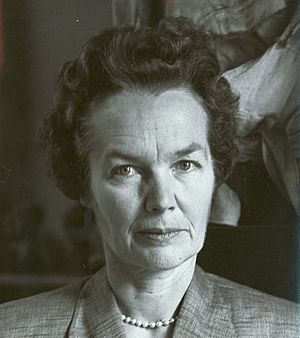Joy Buba facts for kids
Quick facts for kids
Joy Buba
|
|
|---|---|
 |
|
| Born |
Margret Joy Flinsch
July 25, 1904 |
| Died | February 11, 1998 (aged 93) |
| Known for | Sculpture |
|
Notable work
|
Florence R. Sabin |
| Elected | National Sculpture Society |
Joy Buba (born July 25, 1904 – died February 11, 1998) was a talented American artist. She was famous for her sculptures and for illustrating books. Joy Buba created sculptures of many important people. These included American and European leaders. Her art can be found in famous places. Some of these are the National Portrait Gallery and the Vatican Library. Besides sculpting, she also drew pictures for children's books. She often worked with author Herbert Zim.
Contents
Early Life and Art Training
Joy Buba was born on July 25, 1904. Her birthplace was Lloyd's Neck, New York. She started sculpting when she was only six years old. Her formal art training began when she was nine. She first studied art in Greenwich Village in New York City. Later, she traveled to Germany for more education. There, she attended the Städelschule and the Academy of Fine Arts, Munich.
Joy Buba's Career as an Artist
Joy Buba first drew pictures of animals. Then, she started making sculptures of people. Many of her sculptures are displayed in important places. The National Portrait Gallery in Washington, D.C. has several of her works. These include sculptures of Henry L. Stimson, Norman Thomas, and Margaret Sanger.
In 1959, one of her statues was chosen for the National Statuary Hall. This was her statue of Florence R. Sabin. Joy Buba also created sculptures of European figures. These include German Chancellor Konrad Adenauer and Pope Paul VI. The sculpture of Pope Paul VI is kept at the Vatican Library.
Illustrating Books
Before becoming a sculptor, Joy Buba worked as an illustrator. As a teenager, she drew for lecturers at the Naturmuseum Senckenberg. Later, she continued her illustration work in New York. Her first book illustrations were for Proboscidea. This book was written by Henry Fairfield Osborn. It was published in 1936 and again in 1942.
After illustrating an adult book in 1945, Buba focused on children's books. She drew pictures for many books by Herbert Zim. These included popular titles like Goldfish, Rabbits, and Frogs and Toads. Her last children's book illustrations were in Lyrico: The Only Horse of His Kind. This book was written by Elizabeth Vincent Foster in 1970.
How Joy Buba Created Her Sculptures
When Joy Buba made her sculptures, she wanted to capture the true spirit of each person. She called this finding the "quintessence of the person." To do this, she paid close attention to shadows on people's faces. She observed these shadows while talking with her live models. This helped her create very lifelike and expressive sculptures.
Awards and Recognition
Joy Buba was recognized for her artistic talent. She was a Fellow of the National Sculpture Society. This is a special honor for sculptors.
Later Life and Death
Joy Buba passed away on February 11, 1998. She died in Black Mountain, North Carolina.

